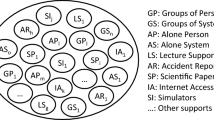Abstract
This special issue contributes to the achievement of challenges related to human factors and automation dedicated to future railway systems. It includes transverse research topics by considering several emerging trends as the design of learning systems, of grades of automation, of cooperative system, or of analysis approaches about feedback of experience. To do so, contributions are detailed in different railway organization levels as training, design, operation, or maintenance. There are based on field studies, on simulation environments or on accident reports. They reveal the value of taking the human into account in the control and supervisory loop for the design, the analysis and the evaluation of future railway systems. Human-centered automation can indeed make system more resilient to various risks and threats by including human contributions through different degrees of automation and modalities of human–machine interaction.
Similar content being viewed by others
References
BEA-TT (2005) Rapport d’enquête technique sur l’accident de tramway survenu à Rouen le 30 août 2004 [Investigation report of a tramway accident in Rouen, France]. Report: BEA-TT-2004-007, 20 June 2005. http://www.bea-tt.developpement-durable.gouv.fr/rouen-r22.html
Besnard D, Cacitti L (2005) Interface changes causing accidents. An empirical study of negative transfer. Internat J Human-Computer Studies 62(1):105–125
Brandenburger N, Naumann A (2019) On track: a series of research about the effects of increasing railway automation on the train driver. IFAC-PapersOnLine 52(19):288–293
Dekker S, Cilliers P, Hofmeyr JH (2011) The complexity of failure: implications of complexity theory for safety investigations. Saf Sci 49(6):939–945
Evans AW (2011) Fatal train accidents on Europe’s railways: 1980–2009. Accident Analysis Prev 43(1):391–401
Gallez, C., Motte-Baumvol, B. (2018). Inclusive mobility or inclusive accessibility? A European perspective. Cuadernos Europeos de Deusto, 2017, Governing Mobility in Europe: Interdisciplinary Perspectives, pp.79–104. (ffhalshs-01683481f)
Habibovic A, Andersson J, Englund C (2019) Automated vehicles: the opportunity to create an inclusive mobility system. Automotive World, 27 March 2019. https://www.automotiveworld.com/articles/automated-vehicles-the-opportunity-to-create-an-inclusive-mobility-system/
Leveson NG, Stephanopoulos GA (2014) System-theoretic, control-inspired view and approach to process safety. AIChE J 60(1):2–14
Powell JP, Fraszczyk A, Cheong CN, Yeung HK (2016) Potential benefits and obstacles of implementing driverless train operation on the tyne and wear metro: a simulation exercise. Urban Rail Transit 2(3–4):114–127
Vanderhaegen F (2017) Towards increased systems resilience: new challenges based on dissonance control for human reliability in cyber-physical & human systems. Annual Rev Control 44:316–322
Vanderhaegen F, Carsten O (2017) Can dissonance engineering improve risk analysis of human–machine systems? CognTechnol Work 19(1):1–12
Wiggins MW, Auton J, Bayl-Smith P, Carrigan A (2020) Optimising the future of technology in organisations: a human factors perspective. Austr J Manage 3:312896220918915
Wilson JR, Norris BJ (2005) Rail human factors: past, present and future. ApplErgono 36(6):649–660
Wilson JR, Farrington-Darby T, Cox G, Bye R, Hockey GRJ (2007) The railway as a socio-technical system: human factors at the heart of successful rail engineering. Proc Inst Mech Eng Part F: J Rail Rapid Transit 221(1):101–115
Author information
Authors and Affiliations
Corresponding author
Additional information
Publisher's Note
Springer Nature remains neutral with regard to jurisdictional claims in published maps and institutional affiliations.
Rights and permissions
About this article
Cite this article
Vanderhaegen, F., Burkhardt, JM., Fang, W. et al. Human factors and automation in future railway systems. Cogn Tech Work 23, 189–192 (2021). https://doi.org/10.1007/s10111-021-00670-3
Received:
Accepted:
Published:
Issue Date:
DOI: https://doi.org/10.1007/s10111-021-00670-3




